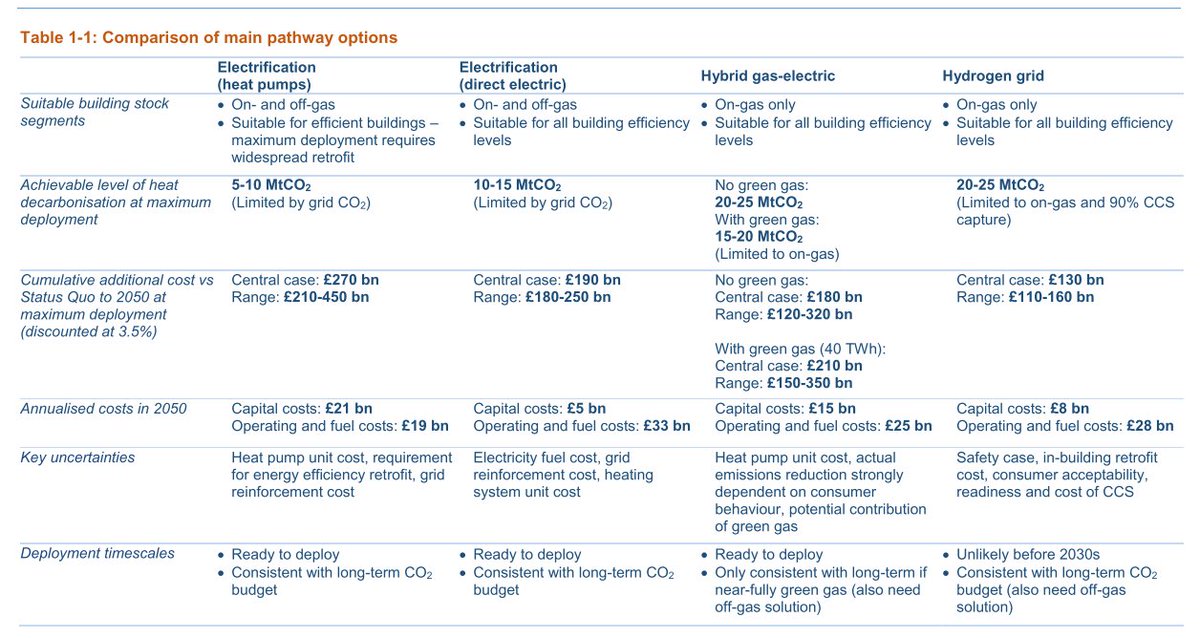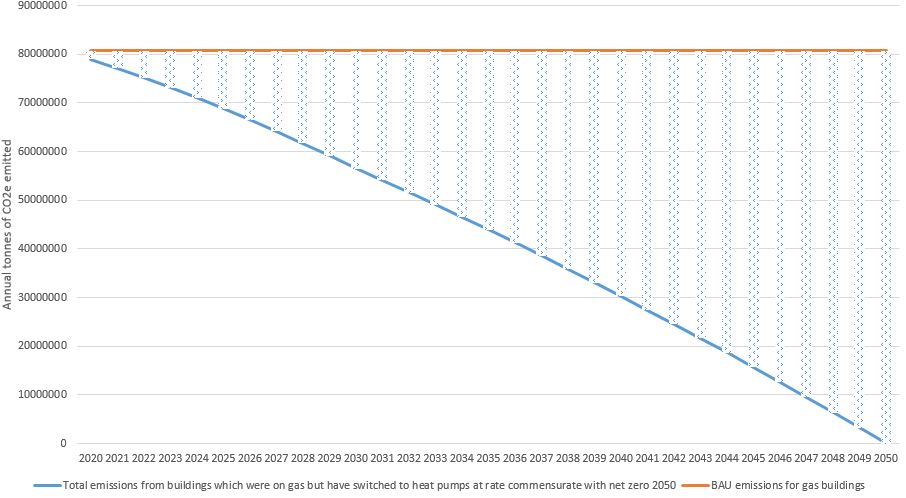
The UK hydrogen strategy outlined the government's support for a 'twin track' approach which supports both 'green' (from renewable electricity) and 'blue' (from fossil gas) hydrogen. This has caused a bit of stir, so what are the issues? (thread).
So firstly, why blue? Well it appears to be linked to a corporate strategy, and it appears to have stuck!
https://twitter.com/MikaaMered/status/1425835681927114755?s=20
So what is it? Well 'blue' hydrogen is produced from fossil gas in a process in which the resulting carbon is captured and stored (i.e. it's Carbon Capture and Storage, CCS). The stored carbon is not expected to reach the atmosphere so has no climate impact.
All the 'blue' hydrogen currently produced, uses the steam methane reformation (SMR) process. Notably in these existing projects, the resulting CO₂ stream is used for enhanced oil recovery, i.e. using pressure to get more oil and gas out of the ground. iea.org/reports/hydrog…
The other method of 'blue' hydrogen production, 'auto thermal reforming' (ATR) is not currently running anywhere according to that database but could in theory have a higher CO₂ capture rate. Which leads to the first major concern:
https://twitter.com/david_joffe/status/1426108195156725763?s=20
Blue hydrogen is not zero greenhouse gas emission. Fugitive emissions of methane during fossil gas production as well as CO₂ leaks mean that 'blue' will always have a carbon footprint. Estimates vary greatly but
https://twitter.com/AukeHoekstra/status/1425919149604282375?s=20
There were disagreements over the assumptions in that paper for both rates of leakage and the 'global warming potential' of methane on twitter last week but the authors argued they used best available data for leakage
https://twitter.com/howarth_cornell/status/1426907977211162627?s=20
As for the discussion around global warming potentials, you can try and decipher if you want to (🤯) but, take away message, methane is significantly more potent a greenhouse gas than CO₂ and methane emissions a big issue
https://twitter.com/mzjacobson/status/1428025973769850880?s=20
So the main takeaway point here is that 'blue' hydrogen is a long way from zero carbon.
Issue number two is that 'blue' hydrogen requires more fossil gas feedstock than using the fossil gas directly because of losses in the process.
Now this isn't necessarily an issue everywhere (subject to fugitive emissions) but for the UK, it absolutely is. Gas imports are currently 55%, are increasing and are expected to reduce to nothing by 2050, without (ahem) shale gas. via @NationalGridESO nationalgrideso.com/document/20285… 

As an aside, those extreme shale gas numbers are extremely high! heatpolicy.wordpress.com/2015/07/02/fra…
So when did 'blue' hydrogen enter UK heating discussions? Well as far as I can remember, the first major inclusion was in the @NatInfraCom 2018 work on heat where it was seen to be a potentially cheaper option than electrification, nic.org.uk/wp-content/upl…
But, in my view the report slightly unfairly compared costs even though the emission reduction potentials were different and back then we knew even under the 2050 target at the time, 75 to 80% reductions would not be enough nic.org.uk/wp-content/upl… 

The 2019 introduction of the net zero law meant that those sorts of emissions from heat were pretty much infeasible in 2050 and since then, it's always appeared (to me at least) that blue hydrogen was a bit dead for heat.
Our 2020 @UKERCHQ policy paper outlined state of the art analysis which pointed clearly towards heat pumps and district heating (alongside energy efficiency) as the most economic heat decarb. pathway ukerc.ac.uk/publications/n…
And very pleasingly (for us authors), the @theCCCuk's sixth carbon budget work suggested something quite similar in their balanced pathway with hydrogen, if used for heat, directed at hybrid systems and in areas near H₂ production theccc.org.uk/publication/si…
Worth noting the the @theCCCuk's 'headwind' pathway does see a greater role of hydrogen for heat but, is extremely reliant on carbon capture and storage to produce all of the hydrogen and needs high CO₂ capture rates to be viable theccc.org.uk/wp-content/upl… 

The feasibility of these capture rates, and the associated costs? That is all yet to be seen. Which brings us back to today's news: theguardian.com/environment/20…
There is of course an argument that 'blue' can be useful on the path to 'green' hydrogen as green costs fall. This from the BEIS report on potential costs: assets.publishing.service.gov.uk/government/upl… 



But, there is also a concern here that blue gets locked in. BEIS is currently talking about up to 15 year contracts: assets.publishing.service.gov.uk/government/upl…
And a final really important strategic point: I'm not aware of any analysis which shows green hydrogen for heat being any where near as cost-effective as electrification and that's pretty much backed up by fundamental physics associated with conversion csrf.ac.uk/2020/09/hydrog…
The resource/build-out implications picked up elsewhere previously @ChiefExecCCC thetimes.co.uk/article/switch…
So finally what might the role be for blue H₂? Well if it were me, as I said on the radio earlier in the week, I'd go for green and focus on industry. The @ITMPowerPlc investment in Sheffield is a fantastic thing alongside the mega offshore wind target
https://twitter.com/stetsberlin/status/1427611930039144449?s=20
But, if blue is supported, emission regulation needs to be extremely tight, it should be fairly competing with green on a carbon/cost basis and it should be used in demands which aren't cost effectively electrifiable.
• • •
Missing some Tweet in this thread? You can try to
force a refresh








